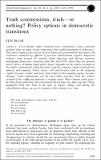| dc.contributor.author |
Elin Skaar |
| dc.coverage.spatial |
United States |
| dc.date.accessioned |
2016-01-07T15:29:38Z |
| dc.date.available |
2016-01-07T15:29:38Z |
| dc.identifier.uri |
http://desa1.cejamericas.org:8080/handle/2015/3670 |
| dc.description.abstract |
Gross human rights violations have constituted a hotly contested national issue in many recent transitions from authoritarianism to democracy. This article analyses how newly elected democratic governments have dealt with violations committed by of® cials of previous authoritarian regimes. Empirical evidence from around 30 (mainly) Latin American and African countries undergoing democratic transition after the mid-1970s shows that the govern- ment’s choice of human rights policy largely depends on the relative strength of the public’s demand for truth and justice and the outgoing regime’s demand for amnesty and impunity. Policy choice will tend towards trials as the outgoing regime becomes weaker and away from trials as the outgoing regime becomes stronger. Truth commissions are the most likely outcome when the relative strength of the con ¯ icting demands is roughly equal. Where human rights policy deviates from predictions, the government always does less than expected. These arguments hold true both at the time of regime change and during the consolidation phase, as power dynamics often change over time. |
| dc.language.iso |
English |
| dc.title |
Truth commissions, trials- or nothing? Policy options in democratic transitions |
| dc.ceja.source |
Fuente: Third World Quarterly |

